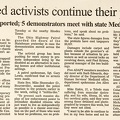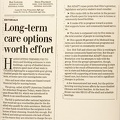The Plain Dealer-Wednesday, November 3, 1999
[image]
[image caption] State Highway Patrol officers escort a man in a motorized wheelchair and a blind man out of the Rhodes State Office Tower yesterday after hundreds of protesters from around the country demonstrated in Columbus a second day to draw attention to Ohio's medicaid spending.
[Headline] Demonstrators target Medicaid spending plan
By J.C. Brown
[the first part of this article is illegible]
Hundreds of protesters--members of the American Disabled for Attendant Programs Today--are here to draw attention to Ohio's Medicaid spending. The group wants the state to spend more for community based programs and less to put people in nursing homes.
The protesters say Ohio ranks near the bottom in the percentage of money spent for institutionalized care rather than home-based services. However, Ohio officials say the number of people receiving in-home attendant care increased 200 percent between 1992 and 1998.
The protesters chanted and pushed against the barred and locked revolving doors, which were steadied by squads of state troopers inside.
At 3:30 p.m., troopers carried some wheelchairs and pulled others to waiting vans and buses. Most people moved willingly.
Late Monday night and early yesterday morning troopers cited 118 people at the Verne Riffe Center after a daylong demonstration by ADAPT members who clocked access to the lobby of Gov. Bob Taft's office on the 30th floor and the lobby of the 14th floor, where House Speaker JoAnn Davidson's office is located.
Shortly before troopers moved in yesterday, ADAPT co-founder Mike Auberger said a meeting had been arranged with Jacqui Romer-Sensky, director of the Ohio Department of Human Services, to discuss Medicaid spending.
Taft spokesman Scott Milburn verified that a meeting was in the works, but he said it developed too late.
[illegible email and phone number]
[new article begins]
[headline] Wheelchair militants command attention: positive and negative
11-8-99
By T.C. Brown
Plain Dealer [illegible]
Columbus--A small but determined wheelchair army descended on the state capital last week, primed for confrontation and eager to draw attention to the light of the disabled who need long-term care.
The national group known as ADAPT, American Disabled for Attendant Programs Today, wants to see community-based care for the disabled expanded.
ADAPT claims Ohio spends 89 percent of its long-term Medicaid dollars to house the disabled in nursing homes and institutions for the mentally retarded or developmentally disabled. Only 11 percent of the funds are spent for home and community-services, the group said, making Ohio one of the 10 worst states in the nation.
Our long-term care system has heavy instiutional bias," said Mike Auberger, of Colorado, ADAPT's co-founder. "This state has been unwilling to shift spending from institutional care to the community."
[some words are cut-off from view in this paragraph] ADAPT's numbers are correct to a point, but the group includes aged in its figures for institutional care, skewing the results; Mel Borkin, an assistant deputy director for the Ohio Department of Human Services, but 250,000 younger Ohians in disabilities qualify for Medicaid coverage, and up to 19,000 of those are in institutions, she said. Ohio spends about $1 billion of the $2.6 billion in Medicaid funds such younger disabled people institutional care, Borkan said.
ADAPT representatives did meet with officials from Ohio's nan services department, although no issues were resolved. However, ADAPT's militant tactics attracted attention.
For three days, more than 300 activists--most in wheelchairs--blocked access to the Verne Raffe Center and Rhodes State Office Tower. The group stages similar actions twice a year across the country. In 1990, ADAPT shut down the U.S. Capitol for seven hours in an effort to jump-start legislation that eventually created the Americans with Disabilities Act.
"Unless they have a direct connection to a disability, the average person has no clue this is an issue," Auberger said. "Our job is to create an opinion. If we put out enough of this stuff, I believe the public opinion will be extremely supportive of what we are doing."
Not in all circles. State Representative George E. Terwilleger, a Lebanon-area Republican, is sponsoring legislation pending in an Ohio House committee to establish a uniform community-based personal assistant program for the disabled, a proposal favored by ADAPT.
[this section is illegible]
Milburn said Taft wanted to meet with the group's leaders, but not until ADAPT agreed to withdraw from Taft's reception area and the 14th and first floors of the Riffe Center.
"One of the Conditions of the meeting was that they cease their illegal activity." Milburn said. "Once they did that, we could work out details."
But the activists refused to leave the building because Greg Moody, taft's executive assistant for health and human services, would commit only to a discussion about setting up a meeting, not to an actual meeting. A 14- hour standoff ensued.
No one was jailed over the three days, but the State Highway Patrol arrested or cited 215 people for ciminal trespassing, a fourth0degree misdemeanor with a maximum penalty of up to 30 days in jail and a $250 fine.
[illegible email and phone number]
- Created on
- Thursday 18 July 2013
- Posted on
- Friday 6 December 2019
- Albums
- Visits
- 354
- Rating score
- no rate
- Rate this photo


0 comments